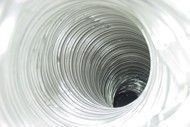 (MCT)—Ray Terry estimates he’s personally inspected and repaired more than 4,000 dryer vents over the past 16 years as the owner of The Almetal Dryer Vent Corporation in Charlotte, N.C., and he’s seen one common problem over and over again that helps contribute to more than 15,000 dryer vent fires annually.
(MCT)—Ray Terry estimates he’s personally inspected and repaired more than 4,000 dryer vents over the past 16 years as the owner of The Almetal Dryer Vent Corporation in Charlotte, N.C., and he’s seen one common problem over and over again that helps contribute to more than 15,000 dryer vent fires annually.
“In the owner’s manual of dryers manufactured in America, it tells you explicitly not to use flex hose,” Terry says.
The flex hose is the white or foil-looking ribbed flexible hose that runs from the back of the dryer to the vent in the wall. Homeowners should replace those hoses with the semi-rigid metal hose now recommended by dryer manufacturers nationwide.
“Flexible hoses catch more lint, therefore clogging your vent up on airflow and overheating your dryer,” Terry says. “Dryer fires are caused by lint buildup. When you have lint buildup in the vent, the air will not flow, therefore the element overheats. When the element overheats, it ignites the residual lint in the vent and you have a dryer vent fire.”
Dryer vents should be inspected and cleaned at least every two years, more often if you have a large family or do large amounts of laundry, says Bob Bryfogle of Dryer Vent Wizard of Central Texas, in Austin.
“For one thing, it shortens the drying times, so you don’t have to wait so long for clothes to get done,” Bryfogle says. “Another reason is it saves on energy costs. Typically, if it takes two cycles to dry the clothes and you have the dryer vent cleaned and it then only takes one cycle to dry the clothes, it reduces the cost for the average family by $18 to $24 a month. So, if you’re saving $20 a month, over a year you’re saving $240 in energy costs. And because you’re using the dryer less, it extends its life.”
The size of the home, length of the vent and how easily accessible it is can factor into the cost of a cleaning, but most dryer vent cleanings range from about $80 to $200. The cost will more than pay for itself in energy savings and in the money homeowners will save on repairing or replacing their dryers. Terry says it’s not uncommon for him to get a call from a befuddled homeowner who just purchased a new dryer thinking their old one was no longer working, only to find the new unit still isn’t drying their clothes as quickly as it should.
“Anytime a clothes dryer takes longer than 45-50 minutes to dry a load of cotton, be it towels or blue jeans, it’s not the clothes dryer, it’s the vent,” Terry says. “I’ve gone in several homes and there’s a new dryer sitting there waiting on me. They didn’t need a new dryer. They just needed their vent cleaned. Unfortunately most people don’t know it and when their dryer is not performing adequately, they think it’s the dryer and go buy a new one.”
Homeowners can keep their dryers operating efficiently by taking a few steps on their own, including cleaning the lint screen before and after each load. An obvious signs of a dryer in need of an inspection is longer drying times, but a dryer that’s hot to the touch during use or one that produces clothes that are hot, damp and smell musty is also likely in need of a vent cleaning.
“Another symptom is if you see a lot of lint on inside of the dryer door,” Bryfogle says. “That’s an indication it’s not leaving the dryer like it should.”
A homeowner hiring a professional vent cleaning company should expect a full inspection before any work is done to ensure their vents actually do need cleaned. A qualified company should inspect the dryer starting from the lint trap all the way to the roof, attic, crawlspace or exterior wall where it vents and present a report to the homeowner identifying possible issues or areas of concern.
Terry and Bryfogle both say their primary goal is to educate homeowners on the importance of a regular vent cleaning.
“I venture to say we’re wasting more energy in this country on our clothes dryers than every (other appliance) combined in a residential setting,” Terry says. “I educate people, not only to make homes safer, but they’ll use a lot less energy and help our country and world be a better place.”
Angie Hicks is the founder of Angie’s List, the nation’s most trusted resource for local consumer reviews on everything from home repair to healthcare.
© 2013, http://www.angieslist.com/
Distributed by MCT Information Services










